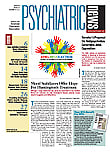The AMA opposes a proposal requiring physicians who use atypical antipsychotics and other medications with black-box warnings for off-label purposes to certify in writing that the use meets certain government requirements.
At the Interim Meeting of the AMA’s House of Delegates last month in New Orleans, delegates approved a resolution opposing the proposal by Sen. Charles Grassley (R-Iowa) requiring physicians to certify that the drug they are prescribing meets minimum criteria for coverage and reimbursement by virtue of being listed in one of the authorized drug compendia used by Medicare.
That resolution was part of a larger one calling on the AMA to collaborate with appropriate national medical specialty societies to create educational tools and programs to promote “the broad and appropriate implementation of nonpharmacological techniques to manage behavioral and psychological symptoms of dementia in nursing home residents and the cautious use of medications.”
Psychiatrist Paul Wick, M.D., a member of the Section Council on Psychiatry, called the Grassley proposal a “disservice to patients.” And it was Wick who offered a change to the original proposal—which would have had AMA collaborate with the Centers for Medicare and Medicaid Services on developing educational tools—amending it so that the AMA would be collaborating with medical specialties rather than with the government.
The proposal on use of antipsychotics for dementia patients received broad support from physicians in other disciplines. Timothy Beittel, M.D., an alternate dele gate from North Carolina who works as a medical director in a long-term-care facility, said physicians are already leaving the practice of medicine in long-term care in part because of burdensome administrative requirements.
Charles Cefalu, M.D., a delegate from the American Geriatric Society, told delegates that 60 percent to 80 percent of patients in long-term-care facilities have dementia. “We recognize the importance of using nonpharmacologic interventions to address [behavioral manifestations of dementia],” he said. “But often in an emergency situation we cannot.”
He added that for the safety of the patient, the caregivers, and the family, the use of an antipsychotic is often the best option. “Currently the standard of care if an antipsychotic is being used is to recommend discontinuation or reduction [of dose] as appropriate when the behavior is under control,” Cefalu said. “Sometimes, however, we have to come back and implement a higher dose for the safety of the patient.”
For that reason he called the Grassley proposal an “overly burdensome” one that would “handcuff” physicians treating dementia patients in an emergency situation.
Other Items of Interest
Other items relevant to psychiatry included a report by the Council on Medical Services that would have the AMA advocate that patients with intellectual disabilities be designated a “medically underserved group,” allowing federal resources to be available to improve access to care and quality of services for those patients (see
AMA Says Intellectual Disability Warrants 'Undeserved' Designation ). Also, the Council on Science and Public Health produced reports addressing an urgent nationwide shortage of prescription drugs and issues surrounding the approval of “biosimilar” drugs (see
AMA: Medication Shortages Are Public-Health Emergency).
Much of the debate around issues at the Interim Meeting—particularly around the financing of the Medicare and Medicaid programs—took place in the shadow of impending congressional deliberations about how to cope with the nation’s debt: at the time of the meeting, the deadline for the so-called “supercommittee,” charged with developing recommendations for reducing the deficit, was just days away. The committee failed to reach an agreement, however, thereby triggering automatic sequestration—severe, across-the-board cuts in spending—scheduled to go into effect in 2013.
For these reasons, it is likely that the AMA’s annual meeting in June 2012—when the 2012 presidential race will be in full swing—will be especially lively. Medicare and Medicaid, implementation of the new health care law, and the impact of a Supreme Court ruling on the insurance mandate in the reform law will figure heavily at the June meeting.
Garnering Suppport for HR 1700
At the Interim Meeting, delegates also reaffirmed the AMA’s commitment to a high-priority grassroots and legislative campaign to garner public support for the AMA-sponsored Medicare Patient Empowerment Act (HR 1700), which would allow physicians and patients to enter into private Medicare contracts with each other for a fee different from the Medicare fee, while still allowing patients to use Medicare benefits for partial reimbursement.
Under current regulations, the only way physicians can negotiate a separate fee is by formally “opting out” of Medicare, which removes the physician from Medicare for two years and necessitates each patient’s signing a statement acknowledging that he or she cannot be reimbursed by Medicare. But at last year’s AMA Annual Meeting in June, delegates approved a resolution calling for the AMA to advocate for the new payment option (Psychiatric News, June 16, 2010).
Also approved after much debate was the Council on Medical Services’ Report on Medicaid Block Grants and Maintenance of Effort Requirements, which recommends that state governments be given the freedom to develop and test different models for improving coverage for patients with low incomes. The CMS report also asks AMA to oppose any efforts to repeal the Medicaid “maintenance of effort requirements” in the health reform law and the American Recovery and Reinvestment Act; both of those laws mandate that states maintain eligibility levels for all existing adult Medicaid beneficiaries until 2014 and for all children in Medicaid and the Children’s Health Insurance Program until 2019.
Not approved was a recommendation in the report that would have put AMA support behind giving states the right to convert Medicaid from an entitlement program to a block grant program as long as certain safeguards were in place.
Supportive testimony stressed that allowing states the option of converting to a block-grant program would help to address Medicaid program costs and underscored the importance of states having the ability to innovate in their approaches to cover their Medicaid-eligible populations. But many physicians opposed the recommendation, saying that states that choose to convert Medicaid to a block-grant program would most likely cut enrollment, decrease provider fees, and reduce benefits.
The council will submit a follow-up report on the subject at the June 2012 meeting.



